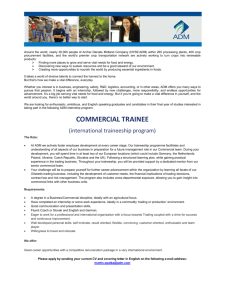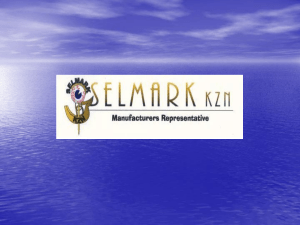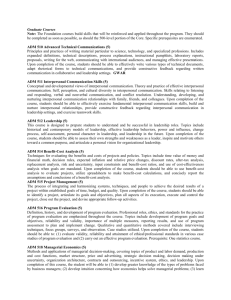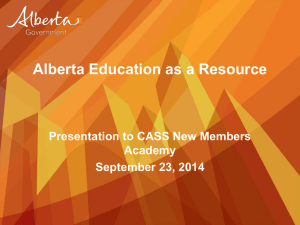Course List and Descriptions
advertisement
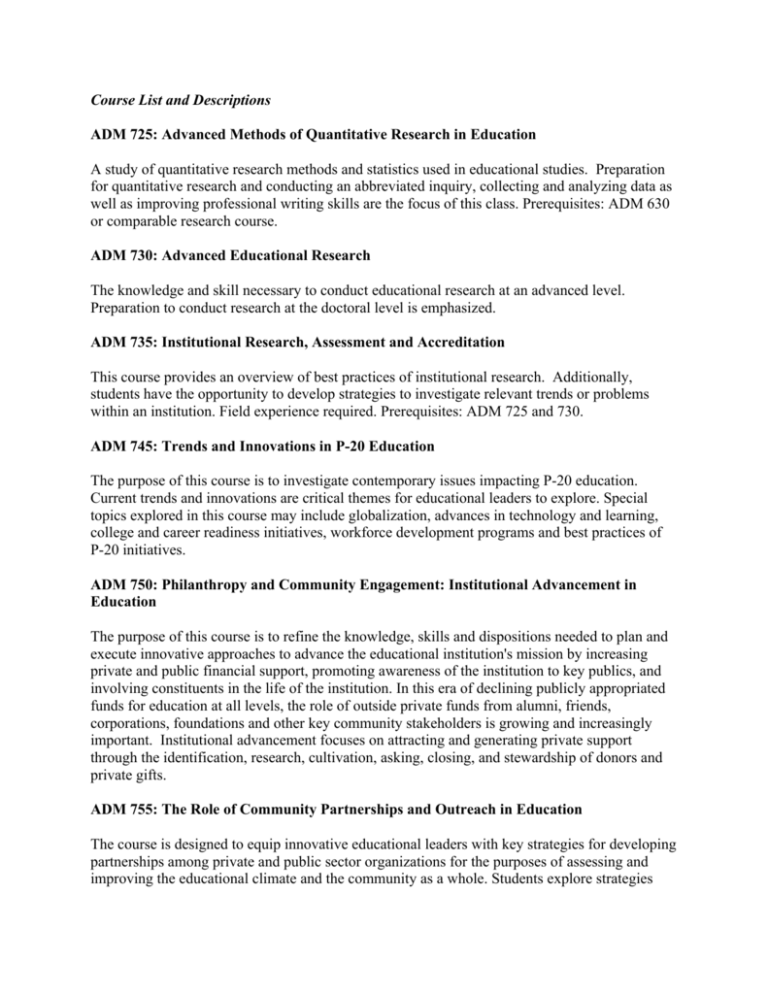
Course List and Descriptions ADM 725: Advanced Methods of Quantitative Research in Education A study of quantitative research methods and statistics used in educational studies. Preparation for quantitative research and conducting an abbreviated inquiry, collecting and analyzing data as well as improving professional writing skills are the focus of this class. Prerequisites: ADM 630 or comparable research course. ADM 730: Advanced Educational Research The knowledge and skill necessary to conduct educational research at an advanced level. Preparation to conduct research at the doctoral level is emphasized. ADM 735: Institutional Research, Assessment and Accreditation This course provides an overview of best practices of institutional research. Additionally, students have the opportunity to develop strategies to investigate relevant trends or problems within an institution. Field experience required. Prerequisites: ADM 725 and 730. ADM 745: Trends and Innovations in P-20 Education The purpose of this course is to investigate contemporary issues impacting P-20 education. Current trends and innovations are critical themes for educational leaders to explore. Special topics explored in this course may include globalization, advances in technology and learning, college and career readiness initiatives, workforce development programs and best practices of P-20 initiatives. ADM 750: Philanthropy and Community Engagement: Institutional Advancement in Education The purpose of this course is to refine the knowledge, skills and dispositions needed to plan and execute innovative approaches to advance the educational institution's mission by increasing private and public financial support, promoting awareness of the institution to key publics, and involving constituents in the life of the institution. In this era of declining publicly appropriated funds for education at all levels, the role of outside private funds from alumni, friends, corporations, foundations and other key community stakeholders is growing and increasingly important. Institutional advancement focuses on attracting and generating private support through the identification, research, cultivation, asking, closing, and stewardship of donors and private gifts. ADM 755: The Role of Community Partnerships and Outreach in Education The course is designed to equip innovative educational leaders with key strategies for developing partnerships among private and public sector organizations for the purposes of assessing and improving the educational climate and the community as a whole. Students explore strategies that mobilize and leverage community support services and incorporate diverse community perspectives. Topics include collaborative leadership, coalition development, developing a constituency/partnership, and the role of an educational leader as an advocate. ADM 760: Executive Leadership Course offers an in-depth examination of factors that contribute to innovative executive leadership practice in a wide variety of educational and organizational settings. Topics in this course include authentic leadership presence, sustainability and leadership, strategic leadership, resiliency strategies and factors of life/work integration. In addition, attention will be placed on common challenges of executive-level leadership. ADM 800: Seminar in Individual Leadership Development Course is designed as a professional leadership development seminar that operationalizes key elements of the doctoral program including program philosophy, signature pedagogy and expectations of doctoral students. Additionally, the course focuses on individual leadership development and professional growth strategies for educational leaders. ADM 810: Leadership and Ethics in a Diverse Society The moral and ethical dimensions of leadership and diversity are the focus of this course. This course is designed to prepare educational leaders to meet the challenges of diversity and rapid societal change within P-20 organizations and learning communities. Techniques, tools and strategies that support ethical leadership and decision-making in the context of P-20 organizations will be examined. ADM 820: Foundations of P-20 Education Course examines the P-20 reform movement from a historical, philosophical, social and economic perspective, with emphasis on the practical manifestations in the current policy environment. ADM 830: Development of P-20 Learners Course examines the characteristics and needs of today’s learners from early childhood to adulthood and the congruence of the current instructional systems and strategies in meeting learners’ needs. The similarity of current and emerging practices at all levels of P-20 education will be examined from a developmental perspective. ADM 900: Clinical Practice I: P-20 Leadership This clinical experience offers intensive, field-based experiences for P-20 and community leaders. Students become immersed in the field of leadership practice where they have the opportunity to study effective leadership practices first-hand, be mentored by exceptional practitioners and practice field-based problem solving. Students develop leadership abilities, administrative competencies and executive-level management skills. Field experience required. Prerequisite: permission of instructor. ADM 910: Clinical Practice II: P-20 Learner Course applies teaching and learning theories to practice through the design and alignment of learning outcomes, assessments and teaching methods at the college level. The clinical instructional experience provides P-20 educational and community leaders an opportunity to explore issues related to P-20 instruction. Field experience required. Prerequisite: permission of instructor. ADM 920: Dissertation Seminar I Course is designed to familiarize students with the academic expectations and requirements for the doctoral dissertation, improve inquiry skills and make significant progress toward successful completion of the dissertation. This course may be repeated for a total of six (6) hours. Graded Pass/Fail. Prerequisite: candidacy status in the Ed.D. program. ADM 930: Dissertation Seminar II This course is designed to provide doctoral candidates with the knowledge of the dissertation proposal process and assist them in successfully defending the design in a proposal hearing. This course may be repeated for a total of nine (9) hours. Graded Pass/Fail. Prerequisite: completion of ADM 920. ADM 940: Dissertation Seminar III The doctoral dissertation is the culminating experience of the Doctor of Education degree involving a scholarly inquiry into an area of professional and intellectual interest. The student will conduct research and complete a report of the findings in the form of a written and oral defense of the research. Students enroll in this course until they have successfully defended their dissertation. This course may be repeated for a total of nine (9) hours. Graded Pass/Fail. Prerequisites: completion of ADM 930 and approval of the Dissertation Proposal. COM 887: Seminar in Organizational Leadership An advanced study of the organizational challenges facing leaders in the 21st century. Requisite knowledge and communication competencies for effective, contemporary leadership are reviewed. The course emphasizes how leaders navigate systemic complexity, collaborative learning, and dialogue among constituents to continuously guide organizations through these challenges. Special emphasis is placed on educational and nonprofit organizations. MGT 801: Educational Entrepreneurism This course will prepare P-20 and community leaders to leverage problem-solving models with emerging technologies to energize, change, and improve their unit’s capabilities and performance. Taught in collaboration with the College of Education, this course will develop leadership skills drawing on business practices. PSE 750: Academic Program Management and Evaluation Course introduces students to the subject of managing and evaluating academic programs in a higher education setting. Faculty credentialing and program assessment practices will be examined. PSE 755: Postsecondary Instructional Support Systems Course examines the comprehensive nature of the instructional support system as a vital component in the evolving P-20 learner-centered environments of education. Theory and effective practice are used to guide the discussion and investigate the issues. Students investigate and seek potential solutions to authentic problems facing educational leaders such as diversity needs of students, instructional support, advising strategies, enrollment management, recruitment and retention, placement testing, career development, residential life, and student activities. PSE 760: Organization and Operations in Postsecondary Education The focus of this course is the management and planning functions within higher education institutions. Students will examine the competencies and training necessary to address key operational and leadership roles specific to the allocation and management of resources to meet the mission of the institution. Resources other than financial will be included and special emphasis will be given to maintenance of facilities, institution and community resources, personnel and time. STM 901: Professional Studies in STEM Education I A field- and research-oriented practicum at Breathitt Veterinary Center, Hancock Biological Station, MARC Center, or another approved MSU area. This course provides practical experience in an area of science, technology, engineering or mathematics designed to complement the main research efforts and expertise of the student. Completion of ADM 800 is required. STM 902: Professional Studies in STEM Education II A field- and research-oriented practicum at Breathitt Veterinary Center, Hancock Biological Station, MARC Center, or another approved MSU area. This course provides practical experience in an area of science, technology, engineering or mathematics designed to complement the main research efforts and expertise of the student. Completion of ADM 800 is required. STM 904: Emerging Trends in STEM Education The purpose of this course is to investigate contemporary issues impacting STEM areas. Special topics explored in this course may include public policy, regional, national, or global trends, and educational practice. Completion of ADM 800 is required.
